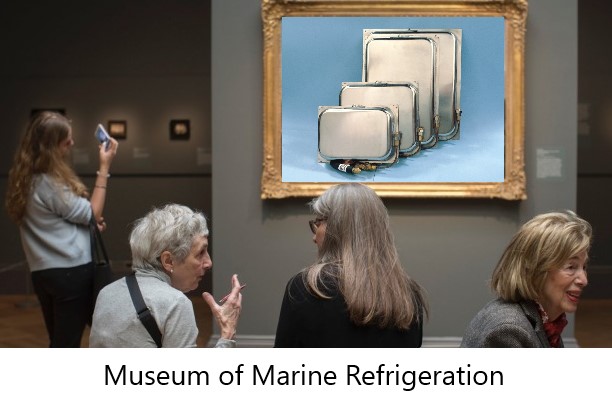Phone: (301) 352-5738
Email: info@CoastalClimateControl.com
Office | Warehouse:
1598 Whitehall Road, Suite D
Annapolis, Maryland 21409
The owners of the Hylas 54, Genevieve, have a clever and beautiful solution for installing solar panels on their yacht that compliments her elegant lines, makes aft boarding via the swim ladder easy, and provides shade for the dingy when stored on the davits. All without adding extra weight on the back end.
Below is what they've shared on www.cruisersforum.com:
We wanted to add significant solar area but we were not keen on putting panels on deck (shading, slippery), on rail “wings”, or on the canvas bimini top (shading, dynamic substrate, complex wire routing, not useable when boat stripped bare for storage). We wanted a solution that looked in keeping with the existing boat structures and we did not care for sharp-cornered aluminum flat frame panel solution often seen.
Ah, the holiday season has begun. We are being increasingly made aware of that because things have started heating up in already warm places, most noticeably The Caribbean.
There’s a lot of folk spending the holidays on their boats down there at this time of year, and bully for you all. Meanwhile, there are many others that are paying big bucks for the privilege of holidaying on someone else’s dreamboat, and that’s where the heat comes from for us up here in colder climes.
Things that break can’t wait around to get fixed on a charter boat with a bunch of high-paying guests on board who are expecting everything to be perfect. And things do break on boats all the time, usually at the most inopportune moment, a fact that many of you will undoubtedly attest to.
It’s starting to get crazy again on our help line, like it seems to every year about this time. I guess that there’s a big increase in numbers of boats swanning around down south now that it’s holiday season and it’s getting nippy up north. Lucky them!
But there will inevitably be the unfortunate few cruisers that will soon be heading down a long and frustrating path trying to fix a malfunctioning refrigerator or freezer. So in an effort to minimize the pain, and to hopefully make my life easier, I’m re-issuing some advice I gave a few years back on the subject.
This, unfortunately, is even more relevant today since the advent of those flashy electronic refrigerant gauge sets with multiple digital screens that seem to confuse more than enlighten.
Our office here spends way too much time on the phone and in e-mails helping customers correct mistakes made by mostly well intentioned but misinformed and inexperienced technicians. Too often it seems that adding refrigerant has been a Hail Mary move, made after diagnosis was unsuccessful, and done in an effort to show the customer that at least something had been done. And that's where all the problems start ....
“I wandered lonely as a cloud” mused the wordsmith Wordsworth circa 1800.
“I gotta ramble on” screeched Robert Plant of Led Zeppelin in 1969.
“How was I supposed to know I was walking in the bike lane?” uttered this author last week after a near miss with a speeding bicycle in a dark and damp Amsterdam.
These legs of mine have done a lot of wandering and rambling lately, with the rest of me going along for the ride. First it was tramping the boardwalks and docks in the Ft Lauderdale International Boat Show, mostly stumbling along behind shuffling gawkers guessing how much this mega-yacht costs, or wondering who might own that one. That, combined with pacing the booth day after day, makes for a tiring time, but that was followed by three days back in the office before popping over to the UK for a weekend break prior to heading to Amsterdam.
Early pioneers of marine lithium battery systems used individual cells in a rectangular format, and some still do. These types of cells are referred to as “prismatic”, which by definition means having the form of a prism, which is hardly a representative description unless you imagine two prisms joined together to make a rectangle. A more accurate description would be: “a right rectangular prism”, as opposed to a “wrong” or a “left” rectangular prism, one supposes. But I digress …
A couple of years ago I reported on the Ft. Lauderdale Piss-Off for powerboats. There the objective appeared to be to make the most ridiculous air conditioning cooling water discharge, in particular being at the greatest height and with the furthest trajectory, while producing the greatest audible nuisance along the way. The desired effect was seemingly to fill up the neighbor’s dinghy or piss on to the dock and drench a boat shoe or two. Last week at the Annapolis Sailboat Show it was the blow-boats turn, where some interesting and innovative solutions were to be found.
Decisions, decisions. We often get faced with situations that require making a quick decision or a choice one way or the other.
To some this comes naturally, to others (like me) it is against our natural tendency to want to analyze the situation thoroughly and then methodically choose one course of action over another.
My recent yearning to try playing some sort of musical instrument is a case in point. I have a lovely acoustic guitar that sits un-played for most of the year and then gets the Leo Kottke treatment when my friend Bruce comes to stay, but I never really got in to it. For a while I pondered giving the acoustic another stab, but then one day a fellow exhibitor at a boat show suggested I give the bass guitar a go, as that was his instrument of choice. His reasoning was that:
We’re still on the electrical trail this week, but I promise I’ll have some more entertaining stuff for you soon. Mind you, electricity can get quite entertaining if you don’t do things correctly, just ask this guy!
A conundrum cropped up while helping customers plan the change-over from lead-acid batteries to a RELiON lithium battery bank, and we’ll get to that soon. But first let’s review current practices for charging multiple battery banks.
We are proud to offer RELiON Lithium Iron Phosphate batteries, dedicated to high performance energy solutions for serious yacht and RV owners. They are available in standard industry sizes. Custom sizes available upon request. These batteries are Safe, Powerful, Versatile, and Practical. Watch our video below and then Go Here to learn mor
If you haven’t heard on the grape-vine by now, or seen it on our web site, Coastal Climate Control is very pleased to announce that it’s now offering Lithium Iron Phosphate (LiFePO4) batteries from RELiON. These are great products from a great company, and Coastal is stocking the most popular sizes, ready for immediate sale.
Many of you will no doubt be aware of the enormous advantages of LiFePO4 batteries, and there is a whole bunch of information regarding RELiON batteries on our web site here.
We’ve been asked how to charge a lithium battery bank when the boat has been set up for Flooded, GEL, or AGM lead-acid batteries, so let’s look at some of the characteristics of LiFePO4 batteries.
Compressors, how fast should they run?
We had an inquiry recently from someone asking if it was necessary to have some form of speed control on Secop/Danfoss BD35 and BD50 refrigeration compressors. Well the simple answer is “no, it’s not absolutely necessary”, but without it your system may be working way below its capabilities, and with less efficiency.
You see, the Secop (formerly Danfoss) BD35 and BD50 compressors are capable of being controlled externally to run at various speeds between 2,000 and 3,500 RPM, and the cooling capacity is directly linked to compressor speed; i.e. the lower the compressor speed, the lower the cooling capacity.
So why not simply run every compressor at the highest speed and cover all the bases?
We typically look on Annapolis as being a quiet, peaceful town, where the worst thing to worry about is the increasing regularity of flooding downtown due to rising sea levels, or that the National Sailing Hall of Fame would be moving to our nemesis - Newport. That all changed on June 28, when the peace was shattered by the sickening news that five journalists at our local paper, The Capital, had been shot and killed while working at their desks by a lone gunman.
The Capital, known alternatively to locals as The Crab Wrapper or The Naptown News, is truly a local, small-town newspaper where we get updates on our sailorman mayor’s latest schemes, sailboat racing results, and who did what to whom and when. Now we have far more information than we really want on one deranged individual who had a long-standing conflict with some journalists and decided that June 28 was the day when he and his pump-action shotgun would put an end to it. This was no terrorist. This was no religious or political activist. This was simply someone who is mentally ill and who slipped through the cracks.
I have never been comfortable with guns, and I’m sure that sleeping with one under my pillow would cause a high degree of both physical and mental discomfort. I did have occasion once to fire a stainless steel boat shotgun at some flotsam while motoring down the west coast of Central America delivering a 65’ sailboat. It didn’t come naturally so I switched to a flare gun as being my weapon of choice, with that menacingly fat barrel and striking orange handle (stock?). Being a crew of just four, we were formulating a plan of action in case we encountered some bad guys as we paralleled the hostile shores of Guatemala and San Salvador. And encounter them we did …
Series or Parallel - Which current flow option do you make when installing solar panels or battery banks?
There seems to be an increasing need to explain the differences between series and parallel electrical circuits recently, especially regarding battery and solar panel installations. So this week’s blog will be an effort to better explain the advantages and disadvantages of each configuration, and where better to start than with the water analogy … again.
When bad ideas take flight.
Some folk say they hear voices in their heads. Others report ringing in their ears, and yet others seem to have ear-buds permanently glued in place. My head seems to be always full of a mish-mash of ideas, thoughts, and technical tidbits with a little music trickling through from the background for good measure. Some of those ideas turn out be good ideas, whereas some, OK most, are best left unreported and forgotten.
Here’s a wacky idea from a couple of economists, as reported recently by Tim Harford in the Financial Times.
There was a very informative article seen recently in Power and Motor Yacht magazine regarding ground fault interrupters. Nowadays these items may be found in differing guises at both ends of a shore power cable; i.e. on the pedestal on the dock and installed on the vessel, as well as installed in certain 110v outlets on board.
So, what exactly is a ground fault interrupter? Good question.
My first dabble with installing air conditioning on boats was in the mid ‘80’s. I was new to the game and was an eager gofer helping to install a system on a 44’ sailboat. When I mentioned this to my buddies at the bar, they were amazed to hear that you could actually install air conditioning on a sailboat, especially on one that small! Nowadays it’s expected that even 25 footers have air conditioning as a standard item.
Those days were before rotary compressors replaced the noisy, heavy, and power-hungry reciprocating versions, and when one unscrupulous manufacturer would chisel the metal data plate off the compressor in order to fudge the specs to boost their claim that they had bigger units than their competitors. Yes, really!
I’ve just returned from a quick flit to England where I had the pleasure of being able to take several walks in the countryside in some rather splendid weather. The particular region I was in has an abundance of brooks and streams, and these were boisterous and lively following a period of lengthy rain.
Back in the good ol’ days these streams powered all sorts of mills, providing the mechanical power to crush stone, grind corn, saw logs, etc., and the area was littered with either the remains of old mills or with ones converted into other uses (i.e. holiday homes). There would have been a number of mills on one stream, one after the other as the water flowed downhill, with the same water that powered the top mill being used for successive establishments downstream.
What a wonderful early example of a renewable energy source.
Your tech uses refrigeration gauges, but is the answer right for the question?
First there was the abacus. Then there were slide rules (I still have one that I use as a straight edge). After that came rudimentary mechanical calculators followed by electric and then electronic versions, and now calculators have wound up being one of the most rudimentary features of computers, smart phones, watches, etc.
All of the aforementioned devices require that the operator first input the correct information and then give the correct commands in order to be supplied with the desired result. Put in the wrong information and/or give an incorrect command, and the result will be erroneous. Garbage in - Garbage out.
Now imagine that someone picks up an abacus and sees that the beads are arranged to indicate the number 42. So if the answer is 42, what was the question? Was it: “What is 6 x 7”? or “What is 17.5 x (9.8 - 7.4)”? or … Hmm. Maybe 42 is the answer to the ultimate question of life, the universe, and everything.
We have several house rules at Coastal Climate Control. There are the typical ones such as the sign in the warehouse toilet saying “Gentlemen please lower seat when finished”, and then there are unwritten words of wisdom like; ”If you have it, flaunt it”. Personally I’m a bit lacking in flauntable assets, but Coastal sells some of the best specialized marine equipment available, and we flaunt it whenever possible. In fact, next week we will be in very flaunty mood at the Annapolis Spring Sailboat Show April 20 thru 22, so if you’re in town come on by and see what’s new.
Another unwritten house rule is: “If we don’t have it, we can’t sell it”. It seems obvious I know, but keeping adequate stock of popular items is becoming a bit of a problem these days, especially for products that we import. We strive to be good girls and boys and pay our bills on time and plan way ahead in order to anticipate shipping delays, but we still often get caught out, and increasingly so these days. There are three main areas that we have no control over:
So Elon Musk has parked his Tesla in the Milky Way or wherever. Just imagine having the capability and resources to do that, and the mind boggles at the thought of what else you could dispose of up there in the big blue yonder. I presume that he removed the battery before take-off, because those things are heavy.
Yes, I know they are Lithium Ion (LI) batteries, but those are not as light as some imagine. I know this from when I drive my Chevy Volt to my office in Tesla Drive (a bit ironic don’t you think) and feel how solid and sure-footed it is on the highway. That’s because it weighs about 800 pounds more than a similarly sized Chevy Cruze due to the hefty battery pack. But thanks to that 17kw lump, I have sizzling, silent acceleration and decent range in a very stable platform.
Talk is that there’s soon to be an Electric GT motor racing series featuring a modified Tesla. This will no doubt have phenomenal out-of-the-box performance, but weighs in at about 200 pounds more than my road-going Volt, and where less weight = more speed (i.e. on the race track) that means a lot of lithium to be grappling with lurching around the bendy bits.
I started tinkering with LI batteries six years ago, and even made my own 100 amp/hr pack from bits and bobs I bought online. I did it primarily to investigate whether that might be a viable alternative to the few expensive and complex marine LI systems available back then, but soon realized that the safety aspect was paramount.
Those specialized marine LI systems featured external Battery Management Systems (BMS) that could cut loads and/or charging devices if anything got slightly out of whack, and when you’re in the middle of an ocean that’s a pretty important feature. Most of the online offerings I came across were for auto use, where it’s assumed that if something goes wrong you can pull over to side of the road, hop out, and run away. Not so good for a yacht where the closest land may be a just mile away, but happens to be straight down, on the ocean floor.






